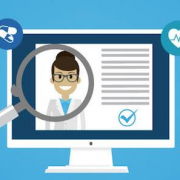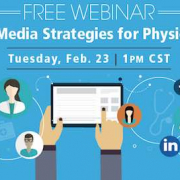Using Social Media without Losing Time—or Your Reputation
Dr. Deanna J. Attai is an ardent proponent of social media among physicians. Every Monday night, she moderates Twitter chats for the Breast Cancer Social Media (#BCSM) community, a worldwide social media support group for people affected by breast cancer. She also has her own blog and social media profiles, which she contributes to regularly.
Last week, Dr. Attai chatted with us about the professional benefits of using social media, including education, scientific collaboration, and online reputation management. This week, we asked her how on earth she finds time to do all that tweeting, liking, and sharing! After all, in addition to her hours in office and doing surgery, she is also President of the American Society of Breast Surgeons and Assistant Clinical Professor of Surgery at the David Geffen School of Medicine at the University of California Los Angeles.
Her answer? Everything in moderation.
Everything in Moderation—Including Social Media
“I might only put up a new blog post every couple of weeks or months, depending on what’s out in the news,” says Dr. Attai.
She says she’s on Twitter a lot more regularly—both to share and read content.
“I can respond to the little things that come up in my feed from day to day, or hour to hour, that don’t necessarily warrant long commentary.”
Preload Tweets on TweetDeck to Save Time
Dr. Attai says she typically reads news headlines on Twitter in the morning when she wakes up, and then takes a few minutes to scroll through posts from physicians in her field, or related fields, to ensure she’s up to speed on the latest news. At lunchtime, she might take a break preload tweets for the rest of her week via TweetDeck.
“You can put into it what you want,” says Dr. Attai. “There’s nothing that says you have to be online every day, there’s nothing that says you have to be constantly checking your Twitter feed. Just do it when you have time and when you want to.”
A Common Sense Approach to Content
Time restrictions aside, one of the other reasons physicians may shy away from using social media is concern for their professional reputation. But as Dr. Attai told us last week, social media can actually be a great way to control and manage your online reputation.
“Patients are going online to look you up before they ever walk in your door, and oftentimes before they even make an appointment,” said Dr. Attai. “And with most physicians, their only online presence is on healthgrades.com or vitals.com, or places like that. You really want to have something that’s your own, something that you control.” Read the full article.
And while it’s true that posting on social media can pose some level of professional risk, the key to managing that risk is good old fashioned common sense, according to Dr. Attai.
Keep it Non-Confrontational
“If I’m chatting with a patient in the office, there are certain things that I’m just not going to bring up, and there are certain topics that I will not discuss,” says Dr. Attai. “Those are the same things that are off-limits for me online. I don’t get into religion or politics, I just pick things that are pertinent to what I do and are non-confrontational, with a little easy chitchat on the side.”
She also likes to post the occasional gardening picture on her Facebook page, which many of her breast cancer patients follow.
“It just humanizes the doctor a little,” she says. “It’s a bit of an ice breaker and it makes you seem more approachable. In my practice, we have long-term patients and we develop relationships with them. Gardening is one of the things we talk about in the office—it’s pretty noncontroversial. Patients bring me in seedlings from their gardens, we swap seeds and things like that.”
Bottom line? Keep it simple and professional.
“We are physicians,” says Dr. Attai. “In everything I do in my life, I am representing myself as a physician. When I go to the farmers market on the weekend in my jeans and T-shirt, I am still expected to behave in a certain way as a physician in a public space. And I think as long as you keep that in mind, you just behave in a way that a physician should in a public space, you’ll be fine.”











Leave a Reply
Want to join the discussion?Feel free to contribute!